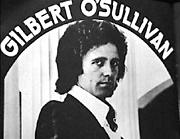Recently, CNN has aired several segments examining a disturbing global health concern. Viruses that were once treatable with antibiotics have evolved, spawning new strains that merely laugh at penicillin and the like. And those popular antibacterial liquid soaps? They’re breeding hardier germs, too, the better to infect you.
Certain hit songs spawn a similar evil legacy. Every time one of these ditties surfaces in pop culture—via a cover version, TV commercial, or movie—the likelihood it’ll do so again multiplies. To illustrate my theory to skeptics in the scientific community, I offer the following example: “Alone Again (Naturally).”
If you’ve never heard it, this song’s high rate of survival will seem ridiculous when the tune is broken down into prose. Imagine the maudlin excesses of Debby Boone’s 1977 chart- topper “You Light Up My Life” coupled with the eerie alienation of “Eleanor Rigby.” Doesn’t exactly say American Bandstand, right? Especially if the recording artist was an overgrown Dickensian urchin with frizzy hair, dressed in knickers and an oversized letter sweater.
Yet in 1972, audiences went nuts over “Alone Again (Naturally)” and its oddball author, British singer-songwriter Gilbert O’Sullivan. Not only did the record hold the No. 1 spot on the US singles chart for six weeks, but over the course of the next 18 months, O’Sullivan racked up a total of five Top 40 hits before drifting back into obscurity.
Evidence of the virulent nature of “Alone Again (Naturally)” began to appear almost immediately. Throughout the ’70s, the lilting melody made the song a favorite of adult contemporary recording artists. Never mind that the lyrics—a twisted triptych of abandonment issues that finds the protagonist contemplating suicide, suffering an existential crisis, and losing both parents—make little narrative sense. Whether it’s a stentorian recitation by Shirley Bassey (on Love, Life and Feelings, 1976) or a lugubrious jazz retread by Sarah Vaughan (Feelin’ Good, 1972), the song seemed capable of exerting its unnerving pull in any interpretation.
O’Sullivan clearly appreciated the staying power of his biggest hit, and he wasn’t afraid to fight to ensure his creation’s strange, sustained popularity. In 1992, he sued New York rap artist Biz Markie, who built a track (“Alone Again”) around an unauthorized snippet of his original recording, and won, setting a legal precedent that severely altered sampling practice in hip-hop. Warner Bros. Records was forced to pull Markie’s album I Need a Haircut from circulation, and the rapper’s career, built on goofy singles like “Vapors” and the Top 10 “Just a Friend,” went down the toilet.
Twenty-eight years after its first chart appearance, “Alone Again (Naturally)” continues to pop up in the media regularly. Sugar Ray bit part of the lyric for their noxious smash “Fly.” O’Sullivan’s own reading popped up in the soundtrack for Sofia Coppola’s flick The Virgin Suicides. It’s only a matter of time before one of those creepy new drugs “to combat shyness” adopts the song for their TV commercials.
But the latest incarnation of the song, featured on Diet for a New America (Americoma Records/Beyond Music) by 58, might just be the end of the line, the fatal DNA mutation that dooms the mighty dinosaur to extinction.
For those of you who haven’t kept abreast of M�y Cre’s activities, 58 is a new band spawned from the union of Cre bassist Nikki Sixx and producer Dave Darling (Meredith Brooks), trafficking in a weird fusion of glam-rock textures with urban beats. And their “Alone Again (Naturally)” is a masterpiece of bad trip-hop that takes the song to gruesome extremes, filled with plinking piano, crunchy beats, and creepy sing-song vocals by Darling and Stink (a woman Nikki sweetly refers to in a recent interview as “this Japanese junkie chick”).
The decision to tackle the tune was reached after the band learned their first choice for a cover, Three Dog Night’s “One,” had been nabbed by Aimee Mann for Magnolia. Sixx ran an Internet search for weird No. 1 hits of the ’70s and came up with “Alone Again.” “He picked something he thought I couldn’t produce,” Darling admits. “The tune was so bizarre to begin with that the idea of making that fit onto our record was a bit of a challenge.”
Only time will tell if this is the last version of “Alone Again (Naturally),” but it’s definitely the weirdest—and that’s saying a lot. But Darling isn’t surprised their rendition is generating a buzz. “It’s kind of familiar, but also, there’s a kind of greasy, sexual quality to [our version] that’s really disturbing. I can’t imagine that people wouldn’t respond to it one way or the other.
“I don’t know that anybody’s told me that they like it, but everybody’s got something to say about it.”






